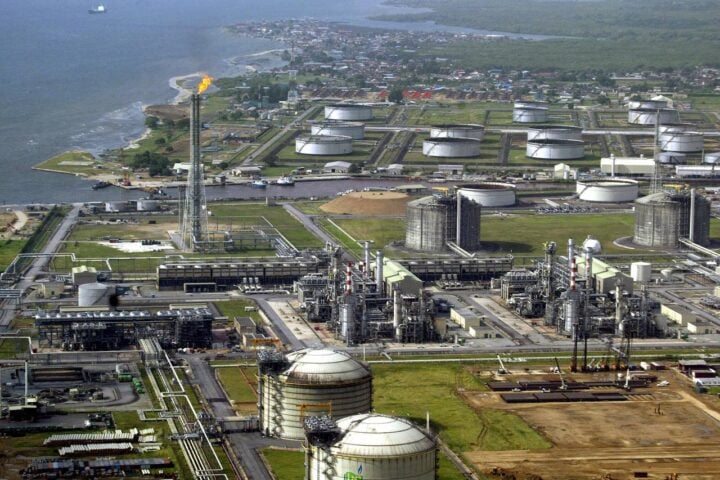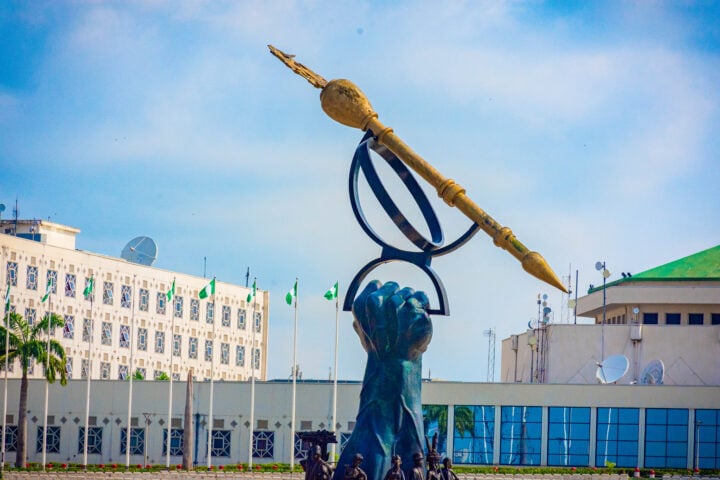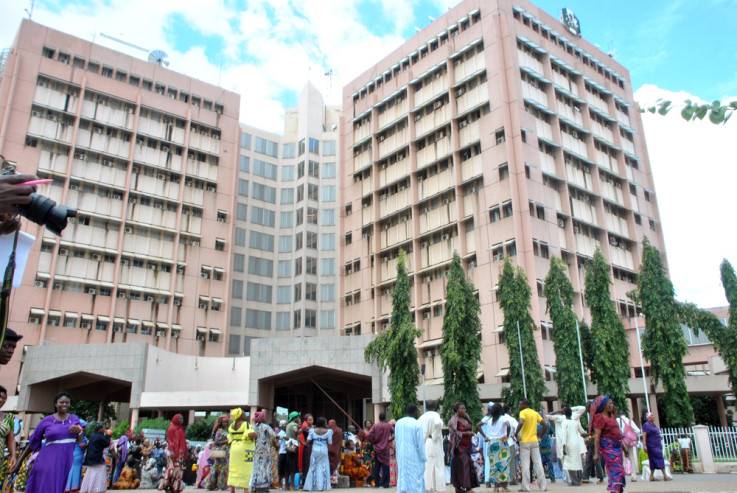Sometimes all was calm. The other times it was chiefly turbulent. But irrespective of the period of disruptions, the Nigerian oil and gas industry experienced a rollercoaster in 2023 with key policy revamps defining the sector in the year.
The occurrences did not come as a surprise as the new administration of President Bola Tinubu had promised to remove all bottlenecks in the industry.
The president’s famous inauguration speech, which abruptly ended the costly petrol subsidy in 2023, would be emblazoned in history as a show of unprecedented political will both in the country’s oil and gas and democratic development.
Whether it is the painful impact of Tinubu’s “subsidy is gone” remarks, the clash between security agencies in the fight against crude oil theft, or the glint of hope in in-country petroleum refining, and the strengthening of output after years of underproduction, Nigeria’s energy sector has undoubtedly had an eventful year.
Advertisement
TheCable presents a few highlights of the sector in the year.
REMOVAL OF PETROL SUBSIDY
A major development in the oil industry that shook the Nigerian economy and the country at large in 2023 was the removal of the petrol subsidy.
Advertisement
In 2022, the federal government said subsidy payments would end by June 2023, even as N3.36 trillion was budgeted for the six-month period.
The subsidy payments, also known as under-recovery, had been termed a ‘burden’ that the federal government could no longer fund.
So when Tinubu, in his inauguration speech said, “petrol subsidy is gone”, a new era was birthed.
The Nigerian National Petroleum Company (NNPC) Limited immediately adjusted the price of petrol across its retail outlets — with the product currently selling at over 200 percent above the pre-subsidy era.
Advertisement
The policy elicited mixed reactions from Nigerians. More prominently, the petrol price increased, resulting in hardship for the entire country.
As Nigerians adjusted to the new realities, the country’s inflation rose to 22.41 percent in May 2023, up from 22.22 percent in the previous month. Nigeria’s inflation rate has continued to climb since then, currently standing at 28.2 percent.
Despite reports of the subsidy removal being partial, Mele Kyari, NNPC’s group chief executive officer (GCEO), had said the federal government is not making any under-recovery payments.
FG ROLLS OUT CNG BUSES
Advertisement
Amid the raging impact of the subsidy cancellation, the federal government unveiled the presidential compressed natural gas (CNG) initiative.
This was to ameliorate the suffering of Nigerians occasioned by the subsidy removal policy and them cut transport costs.
Advertisement
Vice-President Kashim Shettima said the federal government would ensure mass deployment of CNG vehicles in all states for public transportation.
Delivering his Independence Day speech, Tinubu had said “new CNG conversion kits will start coming in very soon as all hands are on deck to fast-track the usually lengthy procurement process”.
Advertisement
In fulfilment of the federal government’s promises, on October 27, 2023, the initiative was flagged off, with the CNG-powered buses handed over to the state house.
Speaking during the inauguration ceremony, Zacch Adedeji, chairman of the steering committee of the presidential CNG initiative (PCNGI), said state governments had indicated investment interest in the CNG buses.
Advertisement
Following the development, several states rolled out the initiative. On October 29, 2023, the PCNGI inaugurated a CNG vehicle pilot conversion centre in Lagos.
In November, the committee also inaugurated the Abuja CNG conversion and training centre to ensure the attainment of a sustainable energy future in the country. The Kaduna state CNG conversion centre was inaugurated in the same month.
At the sub-national level, Dapo Abiodun, Ogun state governor, launched the CNG-powered mass transit buses in Abeokuta.
Prior to these events, oil marketers had shown interest in ensuring that the initiative was successful.
On June 8, 2023, speaking after a meeting in Abuja, Winifred Akpani, the chairman of Depot and Petroleum Products Marketers Association of Nigeria (DAPPMAN), had said oil marketers agreed to donate 100 CNG buses to help mitigate the effects of petrol subsidy removal.
OIL PRODUCTION FLUCTUATIONS
Nigeria’s crude oil production started strong in 2023, hitting a one-year high in January at 1,258,150 barrels per day (bpd).
Not relenting, production further went up by 3.83 percent to 1,306,304 bpd in February 2023.
However, output suffered a setback in March, declining to 1,268,202 bpd.
The production decline happened after an explosion at a crude tapping point in Rumuekpe community in Emuoha local government area of Rivers state.
Several persons died in the fire incident, which occurred on the Trans-Niger Delta Pipeline (TNP) that passes through the community.
In April, oil production also fell below 1 million bpd, raising questions about the sustainability of the reforms of the government.
But output bounced back in May standing at 1,183,691 bpd; and rose further to 1,248,960 bpd, in June, oil output.
The two-month rally was broken shortly when production dropped to 1,081,396 bpd in July 2023.
Oil production picked up pace in the following months, rising to 1,181,133 bpd in August; 1,346,562 bpd in September, and further to 1,350,573 bpd in October 2023.
However, in November, the oil output fell again to 1,250,299 bpd.
Despite the improved production levels, the country failed to meet the Organisation of Petroleum Exporting Countries (OPEC) output quota of 1.74 milliom bpd during the year.
At its last meeting, OPEC resolved to adjust the output figure, noting that Nigeria can reach a production level of 1.5 million bpd by 2024.
Following the oil cartel’s remark, Heineken Lokpobiri, minister of state for petroleum resources (oil), said the country is on track to surpass the oil production quota projected by the OPEC.
PORT HARCOURT REFINERY COMES ALIVE
Again, another development that melted the hearts of keen observers, is the completion of phase one of the Port Harcourt refinery.
The federal government had promised the facility would begin operations this month — after numerous failed attempts.
But, on December 21, 2023, the NNPC Limited announced the completion of the mechanical phase and flare-up of the refinery.
The development implied that the fixing of the refinery’s equipment and systems had been completed.
Meanwhile, the 650,000 bpd capacity of the Dangote Refinery Petrochemical Limited was inaugurated by former President Muhammadu Buhari in May 2023.
To kickstart production at the plant, the NNPC Limited was expected to allocate six million barrels of crude oil to the refinery.
The plant, on December 8, received its maiden one million barrels of Agbami crude grade from the Shell International Trading and Shipping Company Limited (STASCO).
Subsequently, on December 20, 2023, the Dangote Refinery received the second phase of its crude feedstock from the NNPC Limited.
TANTITA VS NAVY
Another major development in the sector is perhaps the dramatic clash between Tantita Security Services Limited and the navy — the latest occurring in the present month.
On December 7, 2023, operatives of Tantita had claimed that the naval personnel denied security officers access to conduct a joint inspection on an accosted vessel.
However, the navy accused the Tantita of involvement in “these illegalities”.
In its rebuttal, Tantita said it is not involved in oil theft.
The private security firm said it would not join issues with the navy as “we are well aware that Nigerians know who is who”.
Earlier in August 2023, a disagreement had occurred between the navy and Tantita over the port of discharge for a vessel suspected to be conveying stolen crude.
Reports had emerged that Tantita intercepted the MT Praisel vessel, carrying crude oil suspected to have been stolen in the Koko area of Delta state.
However, the navy urged the general public to avoid making assumptions about the alleged stolen oil shipment until laboratory tests and investigations are complete.
In September, the navy handed over four suspects (Tantita officials) allegedly arrested for oil theft to the Lagos state police command.
But the private security firm later demanded the release of its officials, saying “four individuals are part of a movement of a large wooden boat laden with 11 x 1000L Geepee tanks with product suspected to be stolen crude oil”.
Add a comment






